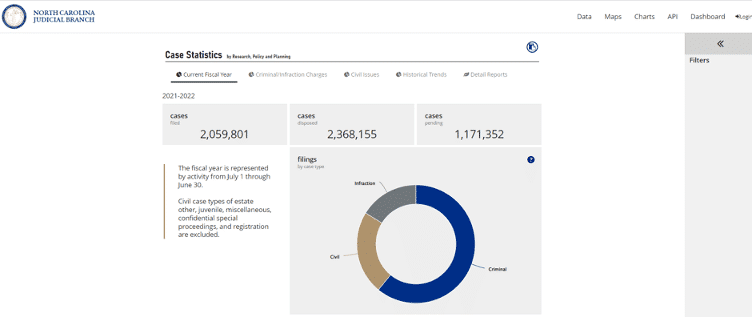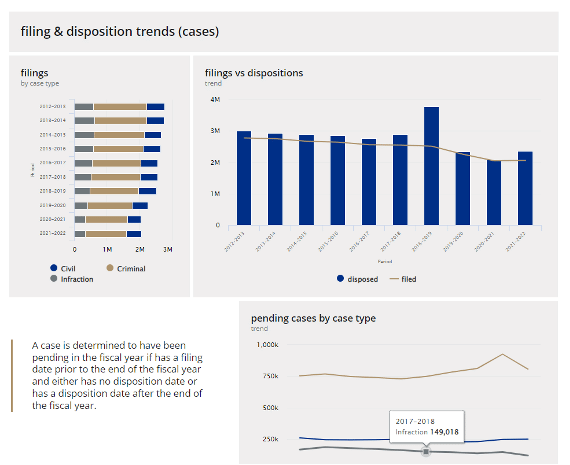The need to open data within state judicial systems

Introducing open data portals can transform the efficiency, effectiveness and transparency of state judiciaries, sharing information with key stakeholders, from legislators and attorneys to citizens. By looking at the experiences of North Carolina, this blog outlines the benefits and challenges to opening up state judicial data.
Data offers all public sector organizations the opportunity to improve decision making, boost efficiency, and increase transparency. At a U.S. state level, this is particularly true of high-profile departments, such as state judiciaries. These are responsible for 90% of all legal cases in the country, handling most civil and criminal cases, and serving as the final arbiters of state laws and constitutions.
The importance of data to state judiciaries
State judiciaries generate huge volumes of data around the progress of current and historic cases that needs to be shared with a wide range of different audiences:
- Judges working within the court system looking at performance and sitting in judgment on cases
- The wider legal community, such as attorneys and court clerks involved in cases
- Officials responsible for monitoring the efficiency and effectiveness of the justice system
- Lawmakers looking to see how courts are performing and any improvements required
- Citizens aiming to better understand the judicial process
- Media, researchers and public institutions searching for current figures on the numbers and type of cases being heard
The judicial system was heavily disrupted by the COVID-19 pandemic, with many cases delayed. Dealing with this backlog is a priority for states, meaning officials need to be able to closely monitor progress towards clearing it, ensuring the right resources are in place to deliver justice to all.
Taking a proactive approach to data sharing within state judiciaries
Thanks to legislation, citizens or attorneys in most states can make Freedom of Information requests to their local public bodies who are legally bound to respond within certain set timeframes. While vital, dealing with these requests can be time-consuming for the public body. Equally requests do not always provide satisfactory answers, for example if the question was unclear in its phrasing.
State judiciaries can therefore increase efficiency and transparency by embracing open data and making information freely available through portals. This delivers multiple benefits:
- Data is instant, meaning questioners don’t have to wait for officials to compile and send answers
- Data is available through self-service, so questioners can find the information they need rather than having to submit specific queries to state judiciaries
- Data is available 24/7 on a public website that is accessible to anyone with an internet browser, from anywhere in the world
If specific information is not available on the open data portal, information requests can still be sent – however by reducing the number of questions asked, state judiciaries can be more efficient and focused in their operations.
The benefits and challenges of opening state judicial data
Taking a proactive approach to data sharing helps state judiciaries better meet their objectives. They can operate more efficiently, saving time and resources, while ensuring that all stakeholders are better informed. Decision-making by officials and lawmakers is based on accurate, up-to-date information, ensuring it is data-driven and transparent.
However, for open data to deliver all of these benefits, portals need to overcome multiple challenges:
- Data has to be complete and timely. State judiciaries span multiple courthouses and divisions, each producing data. It is vital that all of this information is quickly and effectively and seamlessly brought together anonymously in a single place if it is to be valuable.
- Data collection has to be efficient. As with the entire public sector, state judiciaries are guardians of taxpayer resources. They need to operate as efficiently as possible, with the data collection process taking the minimum amount of staff time and budget.
- Data has to be easy to use by non-specialists. It must be easy to find and able to be visualized in different ways by those without technical skills or legal training.
Open judicial data in action in North Carolina
The North Carolina Judicial Branch is responsible for legal affairs within the state. With over 7,000 elected officials and employees it runs North Carolina’s court system, the General Court of Justice. This consists of three divisions: appellate, superior court, and district court.
The North Carolina Administrative Office of the Courts (NCAOC) is the administrative agency for the Judicial Branch providing services and resources to help the unified court system to operate more efficiently and effectively.
- Make courthouses and processes more accessible for lawyers and litigants who have matters before the courts;
- Make the court system more transparent for those seeking to understand how courts uphold the rule of law and administer justice with fairness and impartiality
- Make the court’s online presence more responsive to the technologies and rhythms that define our personal and professional lives in the 21st century.
- To increase openness and effectiveness around data North Carolina is one of a handful of states that has created its own open data portal. Not only does its Opendatasoft-based platform provide access to raw data around caseloads in the state, but it uses an advanced, informative dashboard to share information in a visual way with legislators, attorneys and the general public.
To increase openness and effectiveness around data North Carolina is one of a handful of states that has created its own open data portal. Not only does its Opendatasoft-based platform provide access to raw data around caseloads in the state, but it uses an advanced, informative dashboard to share information in a visual way with legislators, attorneys and the general public.

Visitors to the dashboard can drill down into information, filtering by county, court, offense and case type to generate a personalized view to meet their specific needs. They can also explore trends over time to give vital information that can be used to steer public policy and resources. This is supported by clear text explaining key data for non-specialists and powerful search functionality.

The portal provides invaluable information to the state judiciary and legal profession, increasing efficiency and enabling faster, more informed decision-making, all while demonstrating openness to the wider population.
Becoming data-driven for efficiency and openness
The court system is a vital part of state government, potentially impacting every citizen. Ensuring it is open, transparent and efficient is therefore critical – embracing open data helps deliver on these objectives, benefiting all stakeholders.

Organizational silos prevent data sharing and collaboration, increasing risk and reducing efficiency and innovation. How can companies remove them and ensure that data flows seamlessly around the organization so that it can be used by every employee?


